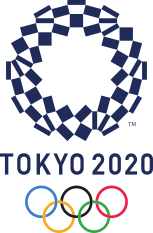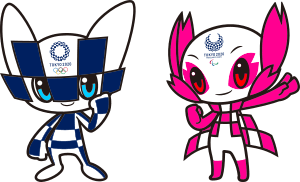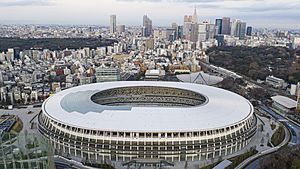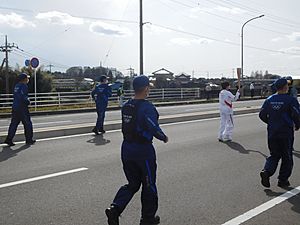2020 Summer Olympics facts for kids
 |
|||
| Host city | Tokyo, Japan | ||
|---|---|---|---|
| Motto | United by Emotion | ||
| Nations | 205 (+ EOR team) | ||
| Athletes | 11,326 | ||
| Events | 339 in 33 sports (50 disciplines) | ||
| Opening | 23 July 2021 | ||
| Closing | 8 August 2021 | ||
| Opened by | |||
| Cauldron | |||
| Stadium | Olympic Stadium | ||
| Summer | |||
|
|||
| Winter | |||
|
|||
The 2020 Summer Olympics, also known as Tokyo 2020, was a huge international sports event. It took place in Tokyo, Japan, from July 23 to August 8, 2021. Some early events started on July 21.
Tokyo was chosen to host the Games back on September 7, 2013. The event was supposed to happen from July 24 to August 9, 2020. However, it was postponed in March 2020 because of the COVID-19 pandemic. This was the first time the Olympic Games had ever been postponed instead of cancelled. Even though it happened in 2021, it kept the name Tokyo 2020 for marketing reasons. Most events were held without fans in the stands due to safety rules. The Summer Paralympics happened soon after, from August 24 to September 5, 2021.
These Games were the fourth Olympic event held in Japan. Japan hosted the Summer Olympics in Tokyo in 1964. They also hosted Winter Olympics in Sapporo in 1972 and Nagano in 1998. Tokyo was supposed to host the 1940 Summer Olympics but had to pull out because of war. Tokyo is the first city in Asia to host the Summer Games twice. The 2020 Games were the second of three Olympics in a row held in East Asia. The 2018 Winter Olympics were in Pyeongchang, South Korea, and the 2022 Winter Olympics were in Beijing, China.
The 2020 Games brought in some exciting new sports. These included 3x3 basketball, freestyle BMX, and mixed-gender team events in many sports. Madison cycling returned for men and was added for women. Host cities can also add new sports for their specific Games. Japan added baseball and softball, karate, sport climbing, surfing, and skateboarding. The last four made their first-ever Olympic appearances.
Some countries made history at these Games. Bermuda and the Philippines won their first-ever Olympic gold medals. Turkmenistan won its first Olympic medal ever.
Contents
Host City Selection: How Tokyo Was Chosen
Six cities wanted to host the 2020 Summer Olympics. The International Olympic Committee (IOC) chose Tokyo, Japan.
Olympic Sports: What Athletes Competed In
The sports played in the 2020 Olympics were similar to past Games. Popular sports included Athletics, Swimming, Tennis, Gymnastics, and Diving. The International Olympic Committee said there would be at least 25 sports in total. Athletes from many countries competed in each sport. They all tried their best to win a medal for their country.
Olympic Venues: Where the Games Were Held
The Olympics took place at many stadiums and locations around Tokyo. The National Olympic Stadium in Tokyo was the main stadium. It hosted the opening and closing ceremonies, along with athletics events. Other sports were held in new and existing stadiums in and around Tokyo. Athletes stayed together in a special Olympic Village.
Olympic Medals: Made from Recycled Electronics
In February 2017, the Tokyo organizers announced a cool program. They partnered with the Japan Environmental Sanitation Center and NTT Docomo. They asked people to donate old electronics like mobile phones. These electronics were then recycled to get materials for the medals.
The goal was to collect eight tonnes (8,000 kg) of metal to make medals for both the Olympic and Paralympic Games. Collection boxes were set up in public places and stores in April 2017. A competition was held to design the medals later that year.
By May 2018, half of the needed bronze was collected. However, getting enough silver was harder. Gold medals actually use silver as a base, so a lot of silver was needed. The collection of bronze was finished by November 2018. All the metal was collected by March 2019.
On July 24, 2019, the medal designs were shown to the public. Junichi Kawanishi designed them after winning a national competition. A special feature of these medals is on their ribbons. Gold, silver, and bronze medals have one, two, or three raised lines. This helps people, especially those who are visually impaired, tell them apart by touch.
Because of COVID-19 rules, athletes received their medals on trays. They then put the medals on themselves. This was different from past Games where a special guest would place the medal around their neck.
Olympic Torch Relay: Hope Lights Our Way
The slogan for the 2020 Summer Olympics torch relay was "Hope Lights Our Way."
The torch relay only visited Greece and Japan. This was because of a rule made in 2009. The first part of the relay began on March 12, 2020. The flame was lit in a traditional ceremony at the Temple of Hera in Olympia, Greece. The torch then traveled to Athens. There, it was handed over to the Japanese team on March 19.
The flame was put into a special lantern and flown to Higashimatsushima in Japan. The torch was then supposed to travel for one week. It would visit areas most affected by the 2011 earthquake and tsunami. This part was called the "Flame of Recovery." After that, the torch would begin its main relay around all 47 prefectures (regions) of Japan.
When the Games were postponed, the torch was kept safe in a lantern. It was displayed in Fukushima for a month. Then it was moved to Tokyo until the relay could start again in 2021. On July 23, 2020, a video was released. It showed Japanese swimmer Rikako Ikee carrying the lantern. This video compared coming out of the pandemic to her own return to sport after having leukemia. On August 20, 2020, it was announced that the torch relay would restart in Naraha, Fukushima, on March 25, 2021. This was almost a year later than planned.
The relay ended at Tokyo's National Stadium on July 23. Tennis star Naomi Osaka had the honor of lighting the Olympic cauldron. This was the final moment of the opening ceremony.
Mascots and Emblems: Symbols of the Games

The official symbols for the 2020 Olympics and Paralympics were shown on April 25, 2016. They were designed by Asao Tokolo, who won a national contest. The design is a ring with an indigo-colored checkerboard pattern.
The official mascot for the 2020 Summer Olympics is Miraitowa. It has blue-checkered patterns inspired by the Games' official symbol. Miraitowa can even teleport! Japanese artist Ryo Taniguchi created the mascots. Japanese elementary school students chose them in a competition. Miraitowa's name comes from Japanese words meaning "future" and "eternity."
The mascot for the Paralympics is Someity. Its name comes from someiyoshino, a type of cherry blossom. Someity's name also sounds like the English phrase "so mighty."
Naoki Satō wrote the music for the medal ceremonies at the 2020 Olympic Games.
Besides the main "Emblem blue," five other colors were used for the Games' branding. These were Kurenai red, Ai blue, Sakura pink, Fuji purple, and Matsuba green. These five traditional colors of Japan were used to add variety and different looks to the branding.
| Summer Games: 1896, 1900, 1904, 1906, 1908, 1912, (1916), 1920, 1924, 1928, 1932, 1936, (1940), (1944), 1948, 1952, 1956, 1960, 1964, 1968, 1972, 1976, 1980, 1984, 1988, 1992, 1996, 2000, 2004, 2008, 2012, 2016, 2020, 2024, 2028 |
||
| Winter Games: 1924, 1928, 1932, 1936, (1940), (1944), 1948, 1952, 1956, 1960, 1964, 1968, 1972, 1976, 1980, 1984, 1988, 1992, 1994, 1998, 2002, 2006, 2010, 2014, 2018, 2022 | ||
| Athens 2004 — Turin 2006 — Beijing 2008 — Vancouver 2010 — London 2012 — Sochi 2014 — Rio 2016 — Pyeongchang 2018 — Tokyo 2020 Games in italics will be held in the future, and those in (brackets) were cancelled because of war. See also: Ancient Olympic Games |
||
| Summer Games: 2010, 2014, 2018 | ||
| Winter Games: 2012, 2016, 2020 |
||
| Singapore 2010 — Innsbruck 2012 — Nanjing 2014 |
||
Images for kids
-
The Olympic rings on display at Tokyo Bay to promote the Games
-
A scene from the Opening Ceremony at the Olympic Stadium, with drones flying around and creating the official logo of the Games
-
Enoshima Yacht Harbor, Kanagawa
See also
 In Spanish: Juegos Olímpicos de Tokio 2020 para niños
In Spanish: Juegos Olímpicos de Tokio 2020 para niños
 | Audre Lorde |
 | John Berry Meachum |
 | Ferdinand Lee Barnett |

















